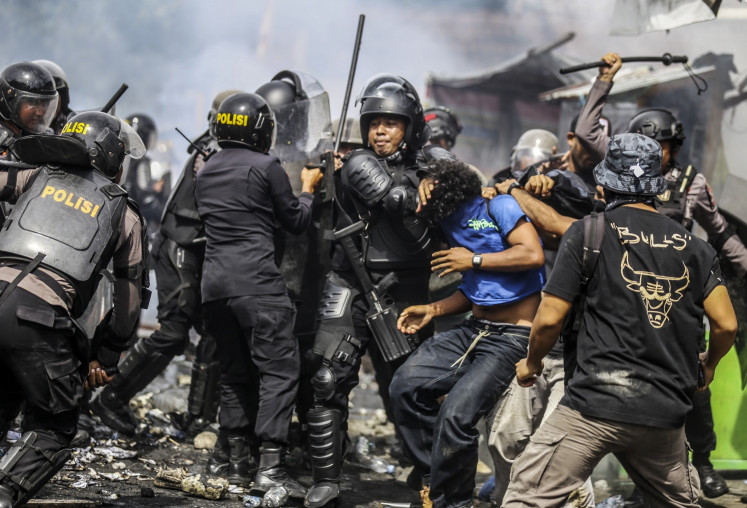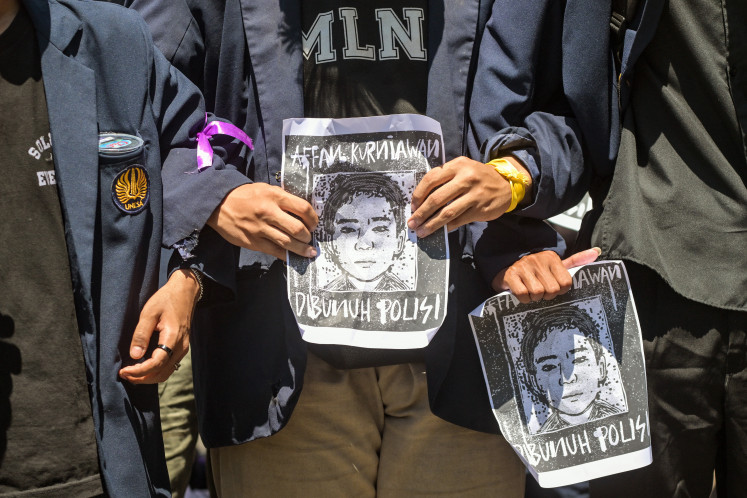Popular Reads
Top Results
Can't find what you're looking for?
View all search resultsPopular Reads
Top Results
Can't find what you're looking for?
View all search resultsCommentary: Is Pew really saying most Indonesians are Muslim radicals?
The US-based Pew Research Center says in its most recent report that nearly half of all Indonesians want adulterers stoned to death and thievesâ hands cut off
Change text size
Gift Premium Articles
to Anyone
T
he US-based Pew Research Center says in its most recent report that nearly half of all Indonesians want adulterers stoned to death and thieves' hands cut off. This is a horrifying finding, but I doubt its accuracy.
When I read the Pew report, I could not help but recall what Soe Hok Gie wrote more than 50 years ago. On Oct. 20, 1961, the Chinese-Indonesian activist wrote in his published diary, Catatan Seorang Demonstran (A Demonstrator's Notes) that he was once asked by a friend if he knew what 'Islam statistik' was. He said he had no idea what that was and his friend told him that 'Islam statistik' were Muslims 'who do not pray or fast. They simply exist [to be counted] in statistics'.
Gie was referring to the many nominal Muslims across Indonesia, which is now home to the world's largest Muslim population. In colloquial terms, they are called 'Islam KTP' or 'Islam abangan'. The term abangan was used by celebrated American anthropologist Clifford Geertz in his seminal work, The Religion of Java, to define a group of Javanese Muslims who favored local customs (a mixture of Islam, Hinduism and animism) instead of Islamic law or sharia.
From colonial times until the early 1990s, the majority of Indonesian Muslims were seldom depicted as devout or observant. According to many orientalists studying Indonesian Islam, for centuries nominal or abangan Muslims dominated the country's political and cultural spheres.
Such a notion was so widely accepted that it prompted British historian William Roff to accuse his Western colleagues of trying to reduce and diminish the role of Islam in Indonesia. Writing for Archipel in 1985, Roff suggested that 'there seemed to be a strange desire by foreign researchers to diminish, conceptually, the place and role of the religion and culture of Islam, now and in the past of Southeast Asian society'.
It is, therefore, baffling to read the conclusion of the Pew study, which states that 72 percent of Indonesian Muslims want sharia law to replace the existing Criminal Code, a colonial legacy that has remained largely intact for decades. It is more shocking to be told that more than 45 percent of Indonesians are supportive of stoning and other cruel and sadistic corporal punishments. All of a sudden, we are being told that the majority of Indonesians are Muslim radicals.
There must be something wrong with the survey. If not, then there must be something horribly wrong with Indonesians. Having been raised as a Muslim and studied Indonesian Islam at the State Islamic University (UIN), I believe (or want to believe) the survey is flawed.
The academic debate over how observant Indonesian Muslims are always boils down to how researchers define Islamic orthodoxy, which could be a moot point. Social scientists mostly agree that Indonesian Muslims are different from many of their Middle Eastern counterparts, but they differ on whether it makes Indonesians less Muslim than, say, people in Afghanistan.
The Pew study admitted that though most Muslims approved of sharia, they did not agree on what sharia meant or how it should be implemented. It is possible that the people interviewed by Pew had no idea what they were talking about. Most Indonesians do not understand Arabic and do not have access to key literature on Islamic law, let alone the opportunity to study it.
Even if they did understand the questions, I doubt that the 1,880 respondents interviewed by the Pew center were telling the truth. Indonesians do not want to be publicly seen as bad Muslims, even though they probably neglect many of the basic Islamic rituals a Muslim is obliged to perform.
It is possible that when they said they supported sharia it was because they thought they had to say it, even though they did not mean it. In reality, based on the election results, the majority of Indonesians did not vote for Islamic parties and most likely think that turning Indonesia into an Islamic state is a bad idea. These people probably abhor the US for backing Israel in the Middle East, but they are also eager to watch Iron Man 3 in theaters this weekend.
According to my observations, Indonesian Muslims are eclectic when it comes to practicing their faith. The Koran condemns this kind of attitude but this is what I have been seeing. It is much easier, for example, to find a Muslim who does not pray five times a day than to find a Muslim who eats pork. Eating pork is probably considered a far greater sin than skipping a prayer.
And I do not think most Muslim women who opt not to wear a hijab (veil) have a good scriptural argument to back up their decision, as some Muslim feminists claim they do. They do not wear a hijab simply because they do not want to.
Since colonial times, there has never been a popular movement that is strong enough to push for the implementation of sharia in the country. The colonial advisers on native affairs, mainly Snouck Hurgronje, did the right thing when they suggested the creation of religious courts for Muslims to settle civil matters according to Islam and the application of a European legal system to deal with crimes. Indonesian Muslims are apparently fine with that. The last time we revised the Criminal Code was 49 years ago.
I am aware that perhaps Indonesians have become more religious than they were and religious fundamentalism is now probably thriving too. But, to say that most Indonesians want sharia to be made 'the official law of the land', as Pew suggests, is a bit far-fetched. I could be wrong and naive for doubting a prestigious pollster. I just find it hard to imagine that at least 4 out of 10 Indonesian Muslims are supportive of stoning a person to death.










